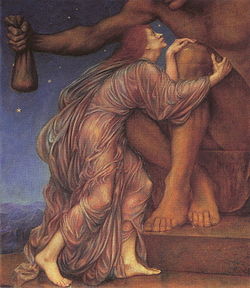
Matthew 6:24
Encyclopedia

Gospel of Matthew
The Gospel According to Matthew is one of the four canonical gospels, one of the three synoptic gospels, and the first book of the New Testament. It tells of the life, ministry, death, and resurrection of Jesus of Nazareth...
in the New Testament
New Testament
The New Testament is the second major division of the Christian biblical canon, the first such division being the much longer Old Testament....
and is part of the Sermon on the Mount
Sermon on the Mount
The Sermon on the Mount is a collection of sayings and teachings of Jesus, which emphasizes his moral teaching found in the Gospel of Matthew...
.
In the King James Version of the Bible
Bible
The Bible refers to any one of the collections of the primary religious texts of Judaism and Christianity. There is no common version of the Bible, as the individual books , their contents and their order vary among denominations...
the text reads:
- No man can serve two masters: for either he
- will hate the one, and love the other; or else
- he will hold to the one, and despise the other.
- Ye cannot serve God and mammon.
The World English Bible
World English Bible
The World English Bible is a public domain translation of the Bible that is currently in draft form. Work on the World English Bible began in 1997 and was known as the American Standard Version 1997...
translates the passage as:
- “No one can serve two masters, for either he
- will hate the one and love the other; or else
- he will be devoted to one and despise the
- other. You can’t serve both God and Mammon.
For a collection of other versions see BibRef Matthew 6:24
This famous verse continues the discussion of wealth, and makes explicit what was implied in Matthew 6:21
Matthew 6:21
Matthew 6:21 is the twenty-first verse of the sixth chapter of the Gospel of Matthew in the New Testament and is part of the Sermon on the Mount...
: a person cannot pursue both material goods and spiritual well being. The two goals are mutually exclusive.
This famous saying also appears at Luke 16:13, but there it comes at the end of the Parable of the Unjust Steward. In Luke the saying is thus clearly one about God and money. In Matthew the previous verses imply it can mean placing anything above God. The word mammon
Mammon
Mammon is a term, derived from the Christian Bible, used to describe material wealth or greed, most often personified as a deity, and sometimes included in the seven princes of Hell.-Etymology:...
was a standard one for money or possessions, and in the literature of the period it is generally not a pejorative term. Frequently Jews were called upon to honour God with their mammon, by making donations. Some other texts, such as 1 Enoch, do use the pursuit of mammon as a negative contrast to the pursuit of holiness. Traditionally it was believed that Mammon was the name of a pagan god who was synonymous with greed, but there is no evidence that a god by this name was ever worshipped and it is uncertain how this word entered the lexicon. Despite this the word is still frequently left untranslated as though it were a personal name. The character of Mammon also appears in the works of Milton
John Milton
John Milton was an English poet, polemicist, a scholarly man of letters, and a civil servant for the Commonwealth of England under Oliver Cromwell...
.
Morris notes that the word serve is literally be a slave to, unlike in Luke where the reference is to servants. Hill notes that while labourers would frequently have more than one employer, it was impossible for a slave to have two masters and the author Matthew may have chosen the slave metaphor as the clearer one. However, Morris notes that Acts 16:16 mentions a slave with more than one master. What Jesus is noting is not a legal impossibility, but a psychological one. While the slave might at first believe he can serve both master's equally eventually he will come to prefer one over the other. The slavery metaphor also can mitigate Jesus' warning. One cannot be a slave to both God and money, but it does not mean that one cannot be both a slave to God and also pursue a reasonable interest in money. This verse is not a call for the renunciation of all wealth, merely a warning against the idolization of the pursuit of money.
Matthew 6:24 also parallels part of Saying 47 of the noncanonical Gospel of Thomas
Gospel of Thomas
The Gospel According to Thomas, commonly shortened to the Gospel of Thomas, is a well preserved early Christian, non-canonical sayings-gospel discovered near Nag Hammadi, Egypt, in December 1945, in one of a group of books known as the Nag Hammadi library...
.

